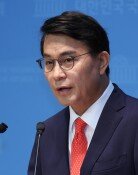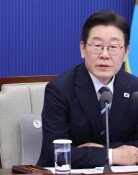[Editorial] What Happened to President Rohs Promises?
[Editorial] What Happened to President Rohs Promises?
Posted May. 13, 2005 23:35,
Today is the first anniversary of President Roh Moo-hyun resuming his presidential authority after the Constitutional Court turned down the impeachment attempt. On returning to his job, in a statement to the public, President Roh admitted his responsibility for the impeachment drive. He also promised that he would preside over state affairs in a conciliatory manner that is beneficial to all and that he would concentrate on reviving the economy.
Sadly, the president did not fully keep his word. The presidents job approval rating rests at 20 to 30 percent. In special elections last month, the low rating became more evident with the governing party being soundly defeated, 0-23. While his administration stresses pragmatism, probing into past history is still a top priority on the list of national affairs. As is clear from the Oil Gate scandal, nepotism and abusive exercise of power by the presidents close associates never go away.
In a decision that struck down the impeachment, the Constitutional Court asked the president the rule of law. But the president condemned the courts judgment against the relocation of the administrative capital, saying, The decision is an attempt by the Constitutional Court to undermine the legislative power of the National Assembly. As a result, President Roh came under fire, causing some to say, The president encouraged mistrust in the judicial process.
In addition, the economy has not escaped the grip of a slowdown. In a statement to Koreans, the president claimed, To stop reforms, some are exaggerating the economic difficulties. According to the Bank of Koreas estimate, however, growth for the first quarter of this year will drop to the two-percent range. Consumer sentiment has started falling again after it seemed to pick up.
Meanwhile, more problematic is diplomacy. Some voice their worries loudly that the presidents cooperative independent defense and balancer in northeast Asia policies caused a rift in the U.S.-Korea alliance. Independent defense sounds good, but it comes with a price tag. The government and the Uri Party reportedly agreed to increase defense expenditures by nine percent every year while discussing the financial management of the nation for the coming five years. If one looks for achievements, the delegation of part of presidential duties is one of them. President Roh has given keen attention to national strategies, and the prime minister has handled less urgent tasks. Consequently, the president could better avoid being at the center of social conflicts compared to his first year as president. Another is that the president contributed to changing peoples attitudes toward businesses through overseas visits.
Now the president needs to recall his pledge a year ago that he would focus on mutually beneficial politics, the revival of the economy, and the livelihood of the ordinary citizens. The situation outside and inside the country is very critical, including the North Korean nuclear crisis. President Roh must govern in a way that puts the citizens welfare on the very top of the agenda. That way alone can guarantee Koreans a bright future.







